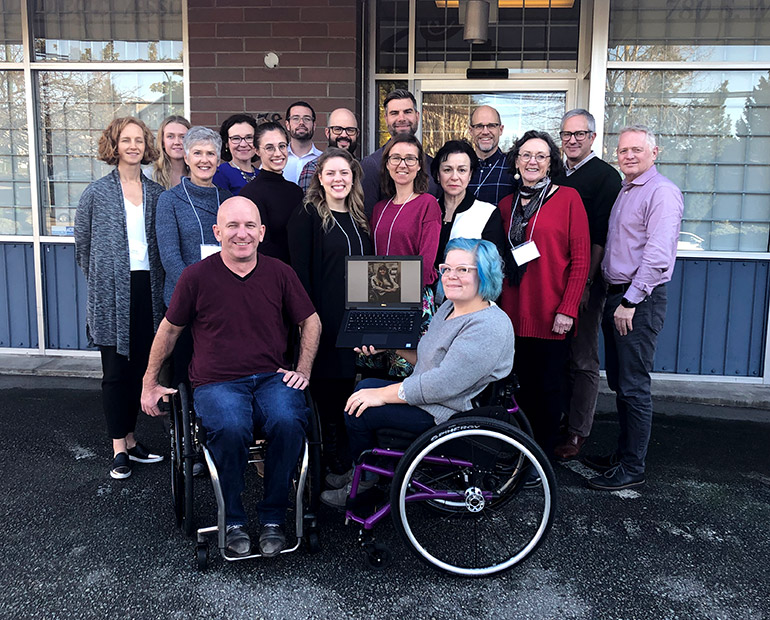
Members of the integrated knowledge translation guiding principles team at the consensus meeting in Vancouver, November 2019.
New principles aim to close the gap between spinal cord injury research and practice
For many scientists, seeing their discoveries make the leap from the lab into the hands of the public can be a major challenge.
With funders and research users continually pushing the importance of the translation of scientific evidence into practice, one UBC Okanagan researcher has developed new tools to help her colleagues make those connections.
The gap between discovery and the application of research is of particular concern for people living with spinal cord injury (SCI), says UBC Okanagan Associate Professor Dr. Heather Gainforth. Often people living with SCI—whose lives could be enhanced by research discoveries—feel their needs and voices are not reflected in the research process.
Although it is clear that knowledge translation is needed to narrow the gap, Gainforth argues that engaging research users as partners throughout the entire process is key to closing that gap.
Driven to respond to the SCI community’s calls for there to be “nothing about us, without us,” Gainforth engaged a North American team of SCI researchers, organizations, people with lived experience of SCI, health professionals and research funders to develop the first rigorously co-developed, consensus-based guidance to support meaningful SCI research partnerships.
“Meaningful engagement of the right research users at the right time throughout the SCI research process helps to ensure that research is relevant, useful and useable,” says Gainforth.
The multidisciplinary group systematically co-developed the set of integrated knowledge translation (IKT) principles that can be used by all partners—researchers, research users and funders of SCI research.
Using data regarding 125 principles of partnered research, the group systematically collected evidence from multiple sources, before meeting as a multidisciplinary expert panel to establish consensus, select the guiding principles and draft the guidance.
“The panel reached 100 per cent consensus on the principles and guidance document,” says Gainforth. “More importantly though, survey data showed that the principles and guidance document were perceived by potential end-users as clear, useful and appropriate.”
Gainforth explains that the co-production approach can help foster meaningful engagement in research, support quality research partnerships and close the gap between research and practice.
“The principles are a foundational tool. Partners who use the guiding principles—early and throughout the entire research process—have the potential to improve the relevance and impact of SCI research, mitigate tokenism and advance the science of partnership.”
“And, this is just the first step,” says Gainforth.
The multidisciplinary team is currently studying the use and impact of the new IKT Guiding Principles.
To learn more visit: ikt.ok.ubc.ca
About UBC's Okanagan campus
UBC’s Okanagan campus is an innovative hub for research and learning founded in 2005 in partnership with local Indigenous peoples, the Syilx Okanagan Nation, in whose territory the campus resides. As part of UBC—ranked among the world’s top 20 public universities—the Okanagan campus combines a globally recognized UBC education with a tight-knit and entrepreneurial community that welcomes students and faculty from around the world in British Columbia’s stunning Okanagan Valley.
To find out more, visit: ok.ubc.ca
 Feds halt activist deportation
Feds halt activist deportation 'Smart' lawyer suspended
'Smart' lawyer suspended First Nation solar farm plans
First Nation solar farm plans Searching landfill for woman
Searching landfill for woman Poland urges more spending
Poland urges more spending Cutting rates at own pace
Cutting rates at own pace Israeli strike played down
Israeli strike played down Full Trump jury seated
Full Trump jury seated World's largest election
World's largest election  Lawsuit over missing nuts
Lawsuit over missing nuts Investigating pipeline blast
Investigating pipeline blast TikTok testing new app
TikTok testing new app Warriors ready for Round 2
Warriors ready for Round 2 Kalamalka Bowl cancelled
Kalamalka Bowl cancelled Rockets live to fight on
Rockets live to fight on Hilton teams up with Sia
Hilton teams up with Sia Swift still 'can't forgive' Kim
Swift still 'can't forgive' Kim Grimes to ‘cap the disarray’
Grimes to ‘cap the disarray’



